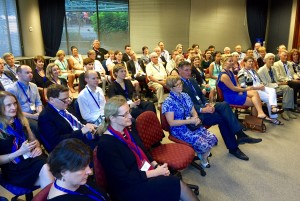Matariki (‘The Seven Sisters’) is a network of seven universities gathered around the vision of ‘partnering for a better world’. The initiative was taken by the University of Otaga, New Zeeland, and after a careful selection process, six additional seats of learning were tied to the network: Dartmouth, Queens, Durham, Tübingen, Uppsala and Western Australia.
The Matariki network was founded in 2011, and as the Executive Board met at Otago University, a new MoU was signed. The meeting also saw future strategies and priorities discussed. The presentation shows that we are a strong, vital network with many activities within shared research areas, and seven different workshops are already being planned for 2016.
Uppsala University has through Isak Stoddard and in cooperation with Otago taken an appreciated initiative for ‘Global Citizenship Programme’, and there will be a workshop on this theme held in Uppsala in April. Our initiative of the Matariki Fellows is particularly popular, and several of the other universities are set to follow. In 2016, six researchers/lecturers from UU will visit a partner university for 3-6 months. A new Vice Chairman was appointed, Philip Hanlon from Dartmouth. As Chairperson, I am grateful to have an engaged Vice Chairman to cooperate with.
The Matariki network arranged a joint Auckland alumni function before the meeting in Dunedin. It was highly appreciated by our alumni, who also appreciated the opportunity to get in touch with alumni from other Matariki Universities, yet another example of how we can synergise with one another.
It will be a while before we, the Vice-Chancellors, meet again in this constellation. The next meet will take place in autumn 2017 in Dartmouth, but we hold video and telephone conferences every semester to continuously develop our cooperation. When working with groups spread all over the globe, it is important to make use of technology in order to cut down on international flights. After our merger with Gotland, we are considerably more well-equipped and experienced in the use of video equipment for remote meetings.
The journey home was a long trip with ample time for reflections and planning the coming week. This week will involve a meeting with the unions, discussions with the senate about the University Management evaluation, and a meeting with Ann Fust to discuss the career investigation. Aside from regular weekly meetings with the Management Council, we are also meeting with the Humanities and Social Sciences deans and I hope to be able to make it to the 10 year anniversary of the new medicine program.
I have been thinking quite a bit about the recent writings in the press lately on about quality in education, dimensioning and exam resits. My fellow Vice-Chancellors, Astrid Söderbergh Widding (Stockholm University) and Torbjörn von Schantz (Lund University) have written good posts about this on their blogs. I fully agree that active student participation and strong student influence is no threat to the quality of the education, but actually contributes to strengthening it! Exam resits, proportioning and the allocation of resources are questions that can be discussed for a long time. We and several others have highlighted the weaknesses of the resource allocation system that exists today and that has existed since the early 90’s. The old system hasn’t yielded any dramatic changes in quality lately, but there are other good reasons for a thorough overhaul, as we have stated many times before. And the main issue is not the demand for throughput, but the long-term devaluation of price tags.
More or fewer students? Who should have the right to higher education in society? Uppsala University has been reducing the amount of students for several years now. The reduction is partially masked by the addition of Gotland’s students when looking at the total figures. The reductions will continue in the future as we have seen our task reduced over the last few years and still maintain a certain amount of overproduction, that is, we educate more students than are being replaced within the framework number established by the state. We can already hear strong claims from within the University that the cutbacks are having negative effects. Freestanding courses grow fewer, our educational offerings more limited, and lifelong learning is threatened. Within the Disciplinary Domain of Science and Technology, there is both the desire and the capacity to create new educational programmes requested by students and employers.
Uppsala is and shall remain a research university – today, research corresponds to about 70 % of our budget. At the same time, I am a strong supporter of our Mission and Core Values, which are further asserted in the Magna Charta. Education and research go together, they are fundamental parts of the definition of a University to me. With several years of reduced admissions, and so many motivated students that are unable to secure a spot at out University, my conclusion is this: we need more, not fewer students.

